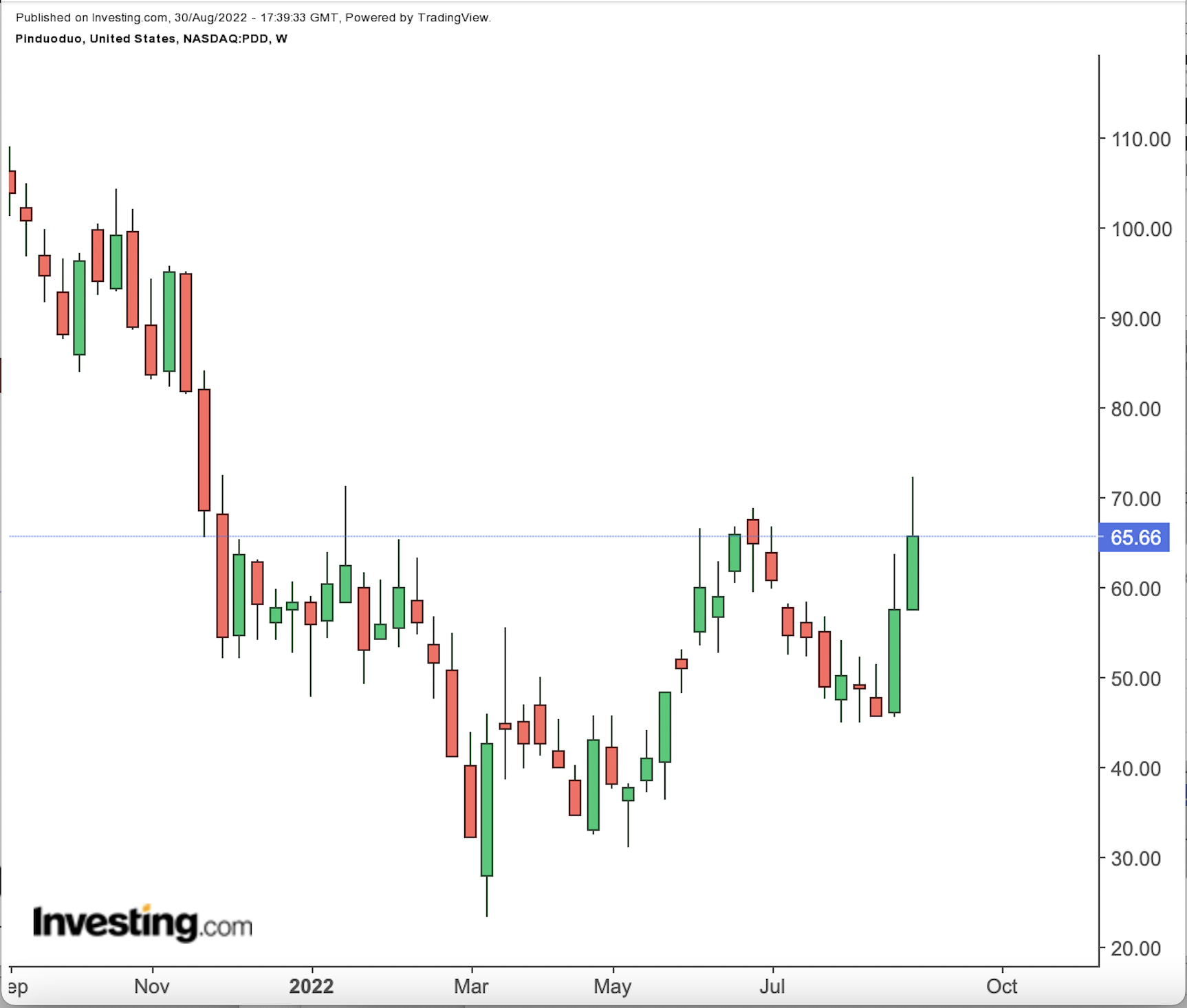- Blowout earnings from Pinduoduo continue an impressive growth story
- The company continues to take market share from larger rivals
- Standard risks about investing in China certainly apply, but investors willing to take those risks should take a long look at PDD
Over the past four quarters, Chinese e-commerce platform Pinduoduo (NASDAQ:PDD) has generated about $14 billion in revenue. That’s an impressive feat, certainly. But it’s far more impressive when considering one key fact: the company was founded in September 2015.
In 2002, seven years after Amazon.com (NASDAQ:AMZN) was founded, it generated just $4 billion in sales. Obviously, e-commerce was a far more nascent business then. But Amazon did not have to compete with existing giants, as did Pinduoduo, which was going up against the likes of Alibaba (NYSE:BABA) and JD.com (NASDAQ:JD).

Source: Investing.com
It was Alphabet (NASDAQ:GOOGL), then known simply as Google, that set the record for the shortest time from founding to $10 billion in revenue. It took that company eight years.
There’s an argument to be made that Pinduoduo — originally founded as an agriculture retailer — is the most successful startup of all time. Yet, that business, even after a rally following blowout earnings last Friday, trades at just 32x trailing 12-month adjusted profit.
To be sure, there are reasons why the earnings multiple here is so low. But even in that context, Pinduoduo stock looks far too cheap — at least for investors willing to take on the risk of owning it.
A Blowout Earnings Report
Rarely you will see a bigger earnings beat than the one Pinduoduo posted in the second quarter. Analyst consensus projected revenue of 23.62 billion yuan; actual results were 31.44 billion yuan, one-third higher. The consensus estimate for adjusted earnings per ADR (American Depositary Receipt, the instrument actually traded on U.S. exchanges, which represents four ordinary shares) was 2.75 yuan; Pinduoduo in fact earned 7.54 yuan.
What’s important beyond the magnitude of the beat is what the predictions, and the results, actually mean about the business. Analysts expected revenue to increase less than 3%; in fact, it rose 36%. Those same analysts expected profits to decline; instead, they more than tripled.
The reason analysts were expecting tepid growth is twofold. First, macroeconomic pressures and continuing lockdowns in China suggested weak demand in the quarter. But, more importantly, Pinduoduo, in fact, had been driving rather tepid growth of late.
In Q1, revenue increased just 7% year-over-year, following a 3% rise in the fourth quarter of 2021. Macroeconomic factors certainly are at play, but live-streaming e-commerce, led by ByteDance’s Douyin (the Chinese version of TikTok) has been a factor as well.
What Q2 does is change the narrative that Pinduoduo is falling behind. That, in turn, should allow investors to focus on recent good news, including the company’s entry into the U.S. market as well as a potential deal that could avert a U.S. delisting.
What Goes Wrong
In other words, there’s plenty of room for the recent rally to continue. The question might be what stops that rally.
One clear risk is that Q2 proves to be an outlier. Management did note on the Q2 call that expenses were lower than expected. Profit margins going forward won’t look quite as impressive as the 27.7% operating margin Pinduoduo posted this quarter. At 32x trailing earnings, that obviously doesn’t break the bull case, but it’s possible the medium-term challenge from Douyin and other rivals continues in the second half of 2022 and beyond.
China itself remains a risk. The Chinese central bank is cutting interest rates amid weak economic data, and the Chinese property market is deteriorating. Fears of a Chinese “hard landing” have persisted for years, if not decades, but it’s possible the country is headed for significant macroeconomic difficulty.
Finally, there’s what Pinduoduo stock actually is. Like BABA, PDD does not represent ownership of the actual business, but rather a variable interest entity based in the Cayman Islands. That structure minimizes the rights of ADR holders, and in a worst-case scenario could become a political football amid the U.S.-China rivalry.
Again, Pinduoduo is far from alone in using the VIE structure (which was established to get around Chinese government restrictions on foreign ownership). Investors in most Chinese stocks are taking on a similar risk.
And that’s the point. For some investors, China right now is simply a no-go. But if an investor is willing to invest in that country, it’s difficult to see a better choice than PDD.
Disclaimer: As of this writing, Vince Martin has no positions in any securities mentioned.
Which stock should you buy in your very next trade?
With valuations skyrocketing in 2024, many investors are uneasy putting more money into stocks. Unsure where to invest next? Get access to our proven portfolios and discover high-potential opportunities.
In 2024 alone, ProPicks AI identified 2 stocks that surged over 150%, 4 additional stocks that leaped over 30%, and 3 more that climbed over 25%. That's an impressive track record.
With portfolios tailored for Dow stocks, S&P stocks, Tech stocks, and Mid Cap stocks, you can explore various wealth-building strategies.
